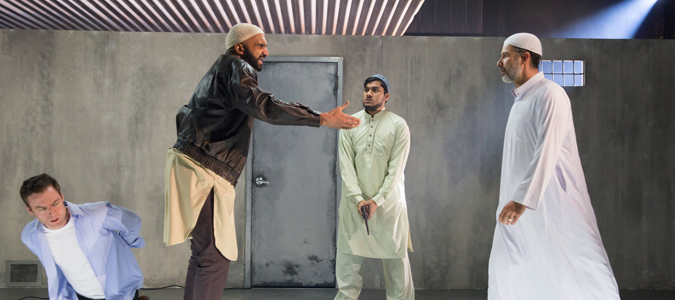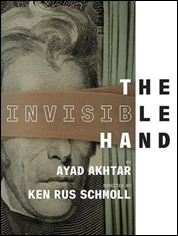

The Invisible Hand
Opening Night: November 19, 2014
Closing: January 4, 2015
Theater: NY Theatre Workshop
Pulitzer Prize-winning playwright Ayad Akhtar (Disgraced) makes his New York Theatre Workshop debut with The Invisible Hand, directed by Ken Rus Schmoll (Red Dog Howls). The Invisible Hand follows Nick Bright, an American stock broker, into a terrifying world of kidnapping and torture in a remote region of Pakistan. As Nick negotiates to save his own life, he begins to see his captors in a new light. This new play is a chilling and complex look at how far we will go to save ourselves and the devastating ramifications of our individual actions.
BUY TICKETSREAD THE REVIEWS:
December 8, 2014
A little knowledge (plus access to world financial markets) is a very dangerous thing. So it goes in the taut new nailbiter from Ayad Akhtar, whose culturally charged 2013 Pulitzer winner Disgraced is now on Broadway. This latest work at New York Theatre Workshop is actually the more satisfying show. In Invisible Hand, Akhtar deftly threads ideas about economics, extremism and the impact of intervention into a timely and relevant tale. Somewhere in Pakistan in the near future, Nick Bright (Justin Kirk of Weeds), a married mid-ranking American banker, is mistakenly taken hostage by a militant group. The gang that couldn’t kidnap straight really wanted Nick’s high-level honcho (oops). In a grungy concrete cell, Nick waits for his ransom to be paid, befriending a docile guard, Dar (Jameal Ali). Violent captor Bashir (Usman Ally) has no interest in making nice. Raised and marginalized in London, Bashir left to fight in Pakistan. He’s got a hair trigger and follows the persuasive Imam Saleem (Dariush Kashani). Nick’s in big trouble.
READ THE REVIEWDecember 8, 2014
How free is the free market? The title of Ayad Akhtar’s The Invisible Hand, now making its New York debut at New York Theatre Workshop, refers to the classical liberal idea that competing interests in a free market will always necessarily keep one another in check. This, of course, assumes a marketplace of equals, each enjoying equal protection under the law. Real-world political power violently collides with that notion in this provocative and timely new play from the author of Disgraced. Like Akhtar’s previous works, this one will undoubtedly lead you out of the theater in a heated debate, reexamining the preciously held beliefs that buttress modern American life. Nick Bright (Justin Kirk) is an American financier working in Pakistan on behalf of Citibank, which is collaborating with the government to privatize the country’s water supply (to the great benefit of corrupt water minister Bilal Ansoor). When a militant Islamist group led by Imam Saleem (Dariush Kashani) attempts to kidnap Ansoor, they inadvertently grab Nick instead. The Imam thinks he can get a ransom of $10 million, but Nick knows that Citibank won’t pay that, even if they were legally allowed. Instead, he convinces the Imam that he can raise his own ransom by strategically investing in the Pakistani market, using the group’s knowledge of impending terrorist attacks to “short” investments controlled by Pakistani government ministers. The Imam agrees, but on the condition that his lieutenant Bashir (Usman Ally) actually performs all the trades. Nick is not to touch a computer. Like a cross between Wall Street and Zero Dark Thirty, the two embark on a deadly spate of insider trading and make a killing in the market.
READ THE REVIEWDecember 8, 2014
Somebody give this playwright a Pulitzer. Oh, right — Ayad Akhtar already has one, for a previous play, Disgraced, which is currently running on Broadway. Although this new one continues the scribe’s interest in the clashing ideologies of Americans and Muslims, The Invisible Hand is far more politically provocative, opening as it does in a Pakistani prison where an American banker is being held for ransom. Confounding initial indications, the play is not a captive narrative about pain and torture but a scary (and dreadfully funny) treatise on the universality of human greed. Akhtar takes the title of his play from Adam Smith, who opined that “the invisible hand” of free market forces will function as an automatic corrective whenever the economy is out of whack. “It is not from the benevolence of the butcher, the brewer or the baker that we expect our dinner,” Smith declared, “but from their regard to their own self interest.” That quasi-religious belief in the profit motive is something to keep in mind during the first act of this charged drama, which opens in a bleak prison cell somewhere in Pakistan, where an American banker named Nick Bright (Justin Kirk, earnest and ultimately endearing), is now in his third week of captivity. Riccardo Hernandez designed the chilling cinderblock of a set and Tyler Micoleau provides the punishing lighting, jointly establishing (with a nice assist from Leah Gelpe’s sound design) a claustrophobic environment that would drive anyone mad. Under the circumstances, Nick is remarkably self-possessed.
READ THE REVIEWDecember 8, 2014
It takes artistry to make an audience care about the vulnerability of an American investment banker these days. But it’s not just the horrific reality of current events that humanizes the central figure in The Invisible Hand, in which one such finance wizard is taken hostage by Islamic militants and cornered into sharing his morally questionable skills of the trade. Ayad Akhtar makes no easy judgments in his politically pointed new play, a taut drama peppered throughout with corrosive humor about ideological differences — and more significantly, overlaps. The playwright’s 2013 Pulitzer Prize winner, Disgraced, probed complex questions of faith and identity, and more recently, The Who and the What tracked thorny disagreements over gender, politics and Islam within an educated Muslim-American family. This new work (which evolved out of an earlier one-act play) further cements Akhtar’s reputation as an uncommonly astute observer of interfaith conflicts, tribalism and clashing cultural perspectives in the 21st century. Disgraced was a knockout in its 2012 New York debut in an intimate space, where the ripple-effect argument that begins during a disintegrating dinner party packed a bracing, inescapable immediacy. But in its current Broadway transfer, upsizing to a larger theater and key cast changes cost the play some spark. The Invisible Hand is a pithy but thematically rich drama of a similar scale and intensity, and this New York Theatre Workshop staging feels like its ideal incarnation. Director Ken Ross Schmoll and an excellent four-person cast make us uncomfortable but willing captives in a concrete-walled bunker, designed with stark realism by Riccardo Hernandez and doused in unforgiving light by Tyler Micoleau. Leah Gelpe’s sharp sound design, its silences broken by the distant hum of U.S. drones and explosions, completes the atmospheric picture.
READ THE REVIEWDecember 8, 2014
The beheadings of journalists and aid workers that have become a grisly aspect of the tumult in the Middle East hover like ugly ghosts behind The Invisible Hand, the latest play by Ayad Akhtar, whose Pulitzer Prize-winning Disgraced can currently be seen on Broadway. Like that sizzling drama, Mr. Akhtar’s shrewd play, which opened on Monday night at New York Theater Workshop, raises probing questions about the roots of the Islamic terrorism that has rattled the world for the last decade and more. The victim under threat here, Nick Bright, played by Justin Kirk, is neither a journalist nor a worker for a charitable organization. He’s a high-level American employee of Citibank in Pakistan, being held by militants. Mr. Akhtar’s intelligent if talky drama is less a suspenseful tale of Nick’s endangerment than an investigation of the manipulation of global financial markets — by good guys or bad guys — and the power of the almighty dollar to shape or shake societies around the world. Nick has already been socked away in a nondescript cell as the play opens, kept handcuffed and under supervision. It’s fairly benign supervision, at first. Dar (Jameal Ali), one of his lower-level captors, is seen clipping Nick’s fingernails while they discuss the profitable financial advice Nick had given him: to stockpile potatoes, wait until the price climbs, then sell at a great profit. Oh, and don’t forget to transfer the takings from the unreliable Pakistani rupee into the dollar. This doesn’t sit well with Nick’s more brutal captor, Bashir (Usman Ally), who accuses him of corrupting Dar with his advice. He threatens that if Citibank doesn’t pay the $10 million ransom they are asking for Nick’s release, he will hand Nick over to Lashkar-e-Jhangvi — the violent Islamic terrorist organization centered in Pakistan that was involved in the infamous killing of the journalist Daniel Pearl.
READ THE REVIEW





















